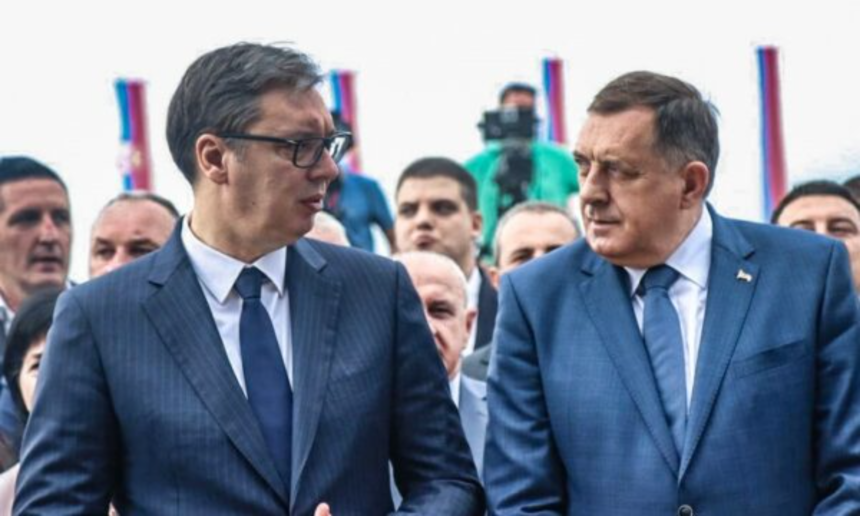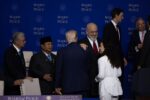Everything Known About “Putinism,” a Form of Autocracy That is Conservative and Populist, Connecting Russia and Vladimir Putin in a Mythical Way, Can Be Seen in Serbia Under Vučić’s Rule, Says Edina Beqirević in an Interview for Radio Free Europe
Edina Beqirević, author of the book “Putinism in the Western Balkans,” says that “Putinism” in the region is especially visible in Serbia under President Aleksandar Vučić. She argues that this form of autocracy is conservative, populist, and connects Russia and Vladimir Putin mythically, just like it does in Serbia.
Beqirević, who works as a lecturer at the Faculty of Criminalistics, Criminology, and Security Studies in Sarajevo and is a researcher at the Atlantic Initiative, announces that her book on the Russian president and his influence mainly in Serbia, Bosnia and Herzegovina, and Montenegro will be published in December.
She notes that she wrote the book mainly for young people and students who often lack “a nuanced perspective on geopolitical issues and the complex dynamics surrounding the Western Balkans and global conflicts.”
She considers Serbian President Aleksandar Vučić and the President of the Serb entity in Bosnia and Herzegovina, Milorad Dodik, to be key players in the spread of “Putinism,” working together to fulfill Russia’s strategic goal of preventing further Euro-Atlantic integrations in the region.
Radio Free Europe: Can we start by describing what “Putinism” is and what forms it takes?
Edina Beqirević: The term was first used in the West by William Safire on January 31, 2000, in an article published in The New York Times when Vladimir Putin was the acting president of Russia. Safire warned that the era of “Putinism” would mark a dark perspective for Russia — a return to repression, stagnation, and autocratic rule.
In that article, he criticized President Bill Clinton for promoting the idea at the Davos summit that Putin could be a hidden democratic reformer.
The predictions made by Safire came true, but the danger of Putin’s regime was ignored for a long time.
In the West, the term “Putinism” began to be used more intensively starting in 2012, and authors agree on several common characteristics.
“Putinism” is a form of autocracy that is conservative and populist. It connects Russia and Vladimir Putin in a mythical way. In short, Putin is Russia and Russia is Putin.
The core values of “Putinism” are anti-liberal, anti-Western, and a war against the “decadent West.”
Political opposition in Russia does not exist, and the fact that so much power is concentrated in one man’s hands has led to the complete collapse of institutions, widespread political repression, and frequent killings of political opponents.
“Putinism” reached its peak with the aggression against Ukraine, which is the most obvious example of imperialist claims.
Radio Free Europe: Who is the main player in spreading “Putinism” in the Western Balkans, and how does it act?
Edina Beqirević: Milorad Dodik (president of the Serb entity in Bosnia and Herzegovina, Republika Srpska) is often mentioned as Putin’s main player in the Western Balkans. He is undoubtedly the most prominent in the interconnected network of individuals, parties, and organizations working for Russian interests in the region.
But let’s be realistic. Milorad Dodik doesn’t make any decisions without consulting Aleksandar Vučić (president of Serbia). Together, they fulfill Russia’s strategic goal, which is to prevent further Euro-Atlantic integrations in the region.
Radio Free Europe: Can we talk about the reasons and consequences of the reinforcement of “Putinism” and Russia’s role in the Western Balkans?
Edina Beqirević: Everything we know about “Putinism” in Russia can largely be seen in Vučić’s Serbia. Both Vučić and Putin cultivate a false messianic narrative about the connection between their personalities and the nations they lead.
In this narrative, they transcend the role of modern leaders, presenting themselves as the protectors of their nations’ “spiritual and historical fates.”
They are portrayed as “national moral guardians,” defending the people from the “evil Western forces,” manipulating public opinion and justifying autocratic rule.
The recent case of the controversial Greek priest Elpidios, who sent a public message to the Serbian people praying for Vučić and warning that if he falls, “the man chosen by Lucifer will take power and the Serbs will become slaves in their own land,” illustrates how Vučić is presented as an essential defender of national identity through a false spiritual narrative.
At the same time, any opposition is framed as treason against Serbian national interests.
Both Serbia and Russia function as autocratic regimes, with the difference that Serbia is a candidate for EU membership. However, according to a well-known Swedish institution, V-Dem, Serbia is now classified as an electoral autocracy.
Aleksandar Vučić can be considered a key actor in spreading “Putinism” in the Western Balkans for several reasons. Under his rule, Serbia has turned towards an accelerated Orthodox Christian traditionalism, while media under his control have successfully spread a pro-Russian and anti-Western narrative.
Democratic processes have not only stalled but are in a dangerous regression. Through political actors and parties under his control, Vučić’s regime is trying to halt liberal reforms even beyond Serbia’s borders.
Radio Free Europe: What role does the Serbian Orthodox Church play in these processes?
Edina Beqirević: The role of the Serbian Orthodox Church in spreading the idea of the “Serb World” aligns with Putin’s concept of the “Russian World.” These two projects are complementary, where both the Russian and Serbian Orthodox Churches are not just religious institutions but also instruments of autocratic regimes and their expansionist goals.
Both churches actively promote the narrative of defending Orthodox believers and speakers of the Serbian and Russian languages outside their mother countries. The term “Serb World” has been intensively used since 2020 and was initially not taken seriously in Western diplomatic circles. It was seen as a form of populism aimed at softening the loss of the “Greater Serbia” project in the 1990s wars.
The irony of this supposed softening of rhetoric became clear immediately, culminating in February 2022, when the “Russian World” served as the ideological framework for the aggression against Ukraine.
It is legitimate to ask whether, at some point, the “Serb World” will start to operationalize in a similar way. For example, Patriarch Porfirije in September 2022 openly normalized Serbia’s territorial claims over Bosnia and Herzegovina, declaring that “the borders of our nation-state are not final.”
The Serbian Orthodox Church plays a similar role in the region as the Russian Orthodox Church towards Ukraine. This was further confirmed by the “Declaration for the Protection of National and Political Rights and the Common Future of the Serbian People” at the “All-Serb Assembly,” which the West considered an attack on the sovereignty of Bosnia and Herzegovina and support for the secessionist plans of Milorad Dodik.
The “All-Serb Assembly” was presented as a supra-national political-theocratic and academic-scientific body, and its organizers were the Republic of Serbia, the Republika Srpska entity, and the Serbian Orthodox Church. Therefore, the “All-Serb Assembly” resembles Iran’s “Assembly of Experts,” and such bodies are characteristic of autocratic and theocratic regimes.
Radio Free Europe: Considering that your book addresses Bosnia and Herzegovina, Serbia, and Montenegro, could you briefly explain some examples of “Putinism” in each of these countries and their effects?
Edina Beqirević: Montenegrin politics, like in other parts of the Western Balkans, reflects a propagandistic model similar to the early days of Putin’s Russia, as described by Peter Pomerantsev in his book Nothing Is True and Everything Is Possible: The Surreal Heart of the New Russia.
This model relies on spreading doubt and insecurity; the political language and ideology are detached from reality, creating an atmosphere where the truth doesn’t matter.
In Montenegro, Serbian nationalism, combined with Russia’s geopolitical agenda, supports narratives that deny Montenegrin national identity, much like Russia’s claims that the Ukrainian nation is a myth.
We should not forget that under the pretext of defending “compatriots abroad,” Russia carried out aggression against Ukraine, and this propaganda is activated before armed conflicts.
In Montenegro, “Putinism” is also reflected in political paradoxes. For example, people accused of attempting a coup to prevent Montenegro’s NATO membership and who were declared pro-Russian figures, like Andrija Mandić, now hold political power in Montenegro, a NATO member.
This is a form of “Putinism” supported by Russia’s hybrid warfare tactics.
In Bosnia and Herzegovina, Dodik’s secessionist ambitions perfectly fit into this framework because any potential fragmentation of Bosnia and Herzegovina would be an opportunity for Serbia to realize its “Serb World” plans.
This alignment of Serbia’s behavior with aggressive actions towards neighbors mirrors Russia’s behavior in the post-Soviet space.
Radio Free Europe: How has Russia’s role so far influenced the path of Western Balkans countries toward the EU?
Edina Beqirević: Unfortunately, Russia, in cooperation with Serbia, has effectively hindered the path of Western Balkans countries toward the EU. From exploiting ethnic tensions to financing political actors, individuals in academic circles, organizations, and media that promote anti-Western ideas, Russia has shaped much of the discourse in this region.
Russia’s presence in the Western Balkans represents a direct challenge to the region’s EU aspirations, significantly complicating the process of Euro-Atlantic integration for many countries.








